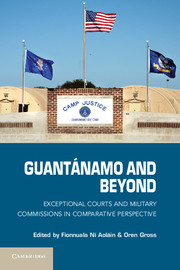Book contents
- Frontmatter
- Contents
- Contributors
- Acknowledgments
- Introduction: Guantánamo and Beyond
- Part I Military Commissions and Exceptional Courts in the United States
- Part II Exceptional Courts and Military Commissions Elsewhere
- 9 The Law Working Itself Pure? The Canadian Experience with Exceptional Courts and Guantánamo
- 10 Vicious and Virtuous Cycles in Prosecuting Terrorism
- 11 Terrorism Prosecution in the United Kingdom
- 12 Trying Terrorists
- 13 Exceptional or Not? An Examination of India's Special Courts in the National Security Context
- Part III International Law, Exceptional Courts, and Military Commissions
- Index
- References
12 - Trying Terrorists
The Israeli Perspective
Published online by Cambridge University Press: 05 June 2014
- Frontmatter
- Contents
- Contributors
- Acknowledgments
- Introduction: Guantánamo and Beyond
- Part I Military Commissions and Exceptional Courts in the United States
- Part II Exceptional Courts and Military Commissions Elsewhere
- 9 The Law Working Itself Pure? The Canadian Experience with Exceptional Courts and Guantánamo
- 10 Vicious and Virtuous Cycles in Prosecuting Terrorism
- 11 Terrorism Prosecution in the United Kingdom
- 12 Trying Terrorists
- 13 Exceptional or Not? An Examination of India's Special Courts in the National Security Context
- Part III International Law, Exceptional Courts, and Military Commissions
- Index
- References
Summary
WHAT IS THE PROPER FORUM IN WHICH SUSPECTED terrorists are to be tried? For the purpose of examining this question, this chapter focuses on the processes that the State of Israel has adopted and contrasts those with the American military commissions. I will argue that despite the great differences between Israel and the Unites States, primarily regarding the structure of the judiciary and the circumstances surrounding the need of each to face this question, a snapshot of today's standpoint reveals that processes in both the United States and Israel produced roughly the same end consequences.
The first part of this chapter discusses the establishment of military courts in the West Bank soon after its occupation by Israel during the Six-Day War in 1967 and the developments and processes that have accompanied the military courts since then. This chapter addresses the central legislation governing the trials and detentions of suspected terrorists and the judicial review led by the Israeli Supreme Court regarding these issues. The second part reviews the resemblance and differences between the United States and Israel, emphasizing the different circumstances that brought about the establishment of military commissions and military courts in the first place, and arguing that these circumstances are inevitably the main cause for the divergence.
- Type
- Chapter
- Information
- Guantánamo and BeyondExceptional Courts and Military Commissions in Comparative Perspective, pp. 267 - 282Publisher: Cambridge University PressPrint publication year: 2013



